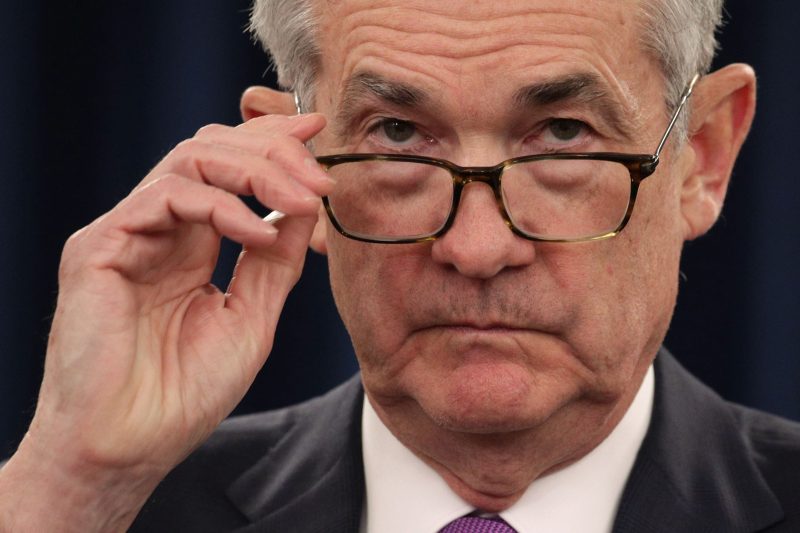Fed opens meeting as Trump calls for deep rate cut
Fed Chairman Jerome Powell will announce the central bank’s decision on Wednesday (ALEX WONG)
Washington (AFP) – The US central bank opened its third policy meeting of the year on Tuesday under renewed attack from President Donald Trump, who called on officials to reverse course and cut interest rates.
Trump slammed the Federal Reserve for “incessantly” raising interest rates and said cutting rates by a full percentage point would make the economy surge.
The Fed raised rates four times last year — and has done so a total of nine times since December 2015 — moving from zero in the aftermath of the global financial crisis to the current range of 2.25 percent to 2.5 percent.
But this year the Fed has been on hold and signaled clearly that it has no intention of moving monetary policy anytime soon as it grapples with conflicting signs on the economy.
Trump’s call for a rate cut of a full point would reverse all of the Fed moves last year and likely undermine any credibility the central bank has with financial markets. And if Trump continues to browbeat the Fed in public comments, central bankers may feel obliged to dig in just to prove their independence.
“We have the potential to go up like a rocket if we did some lowering of rates, like one point,” Trump said in his Twitter outburst.
He said China is boosting its economy by keeping rates low, but “Our Federal Reserve has incessantly lifted interest rates, even though inflation is very low.”
Powell will announce the decision Wednesday and economists and investors will look for any hint in the statement of how central bankers are feeling about the economy and what their next move might be: a hike or a cut.
– Economic crosscurrents –
The rate-setting Federal Open Market Committee now must evaluate crosscurrents in the economic data.
On one hand, the US economy grew 3.2 percent in the first three months of the year, a surprising result given the signs of slowdown in the final months of 2018 that caused financial markets to seem panicked for a time.
But on the other, defying expected behavior in a growing economy with low unemployment, the key measure of inflation continues to fall further below the Fed’s two percent target.
Trump and his economic team have promised that tax cuts and deregulation will accelerate economic growth to three or even four percent but economists say that is unlikely, especially as the US trade war with China and others has dampened business confidence and investment.
“Yes, we are doing very well at 3.2% (first quarter) GDP but with our wonderfully low inflation, we could be setting major records & at the same time make our National Debt start to look small!” Trump tweeted.
But many economists point out that the growth figures for the early part of the year were misleading, inflated by factors that will have the opposite effect in coming months.
The growth rate “vastly overstates the economy’s strength,” Bob Schwartz of Oxford Economics said in a recent analysis.
Without a rebound in spending and business investment, there is little chance the US economy will accelerate and push wages and prices higher.
Some economists now predict the Fed’s next move will be a rate cut, probably next year.
Diane Swonk, chief economist at Grant Thornton, said much of the blame for the financial market turmoil and economic slowdown last year “may be traced to the administration’s own threats of a full-blown trade war with China.”
And US companies report the trade frictions are causing them to delay investments and hiring.
“That doesn’t mean the administration won’t continue to openly blame the Fed,” Swonk said in a commentary, urging the Fed to tune out Trump’s comments.
“The best that Powell can do is to stay the course and keep his noise-cancelling headphones charged to focus on where we are economically, not politically.”
– Stacking the Fed –
Meanwhile, Trump, who named Powell Fed chair, and has appointed three of the six other members of the Fed board, is working to stack the deck even further to push his views on policy.
One of his controversial nominees dropped out of consideration, but conservative commentator Stephen Moore, known for highly criticized views on monetary policy, also faces uncomfortable questions from lawmakers concerning income taxes.
In recent interviews, Moore also has tried to walk back his writings on women and women’s rights.
Even Republican lawmakers have warned that Moore is a dubious choice. Senator Susan Collins told Politico that Moore had “troubling writings about women… and also how he views the Federal Reserve.”
Staunch Trump loyalist Senator Lindsey Graham of South Carolina told reporters Moore’s nomination would be “very problematic.”
Disclaimer: Validity of the above story is for 7 Days from original date of publishing. Source: AFP.


